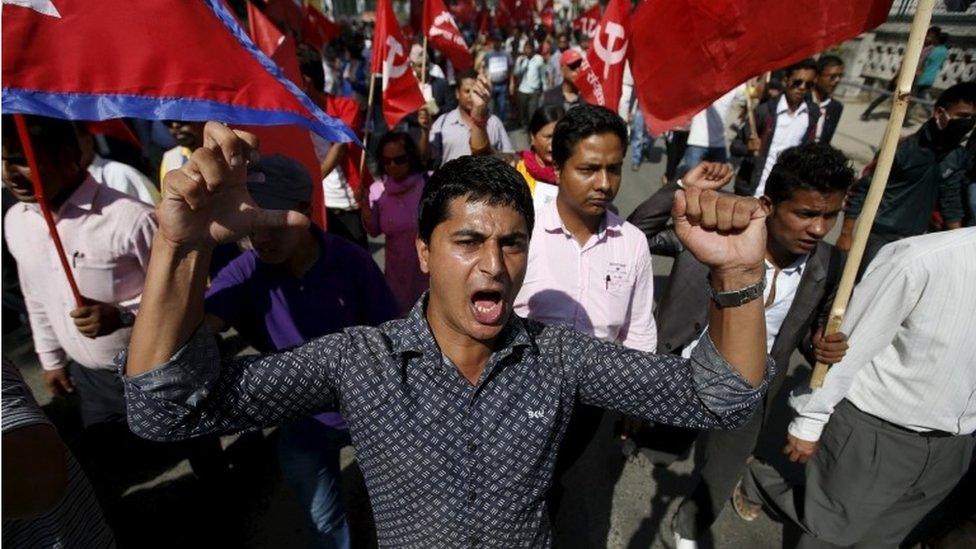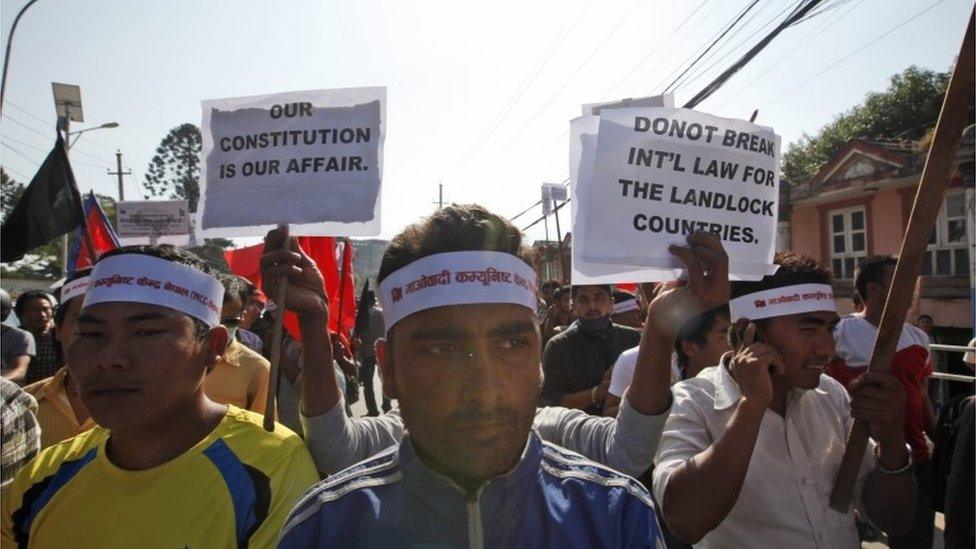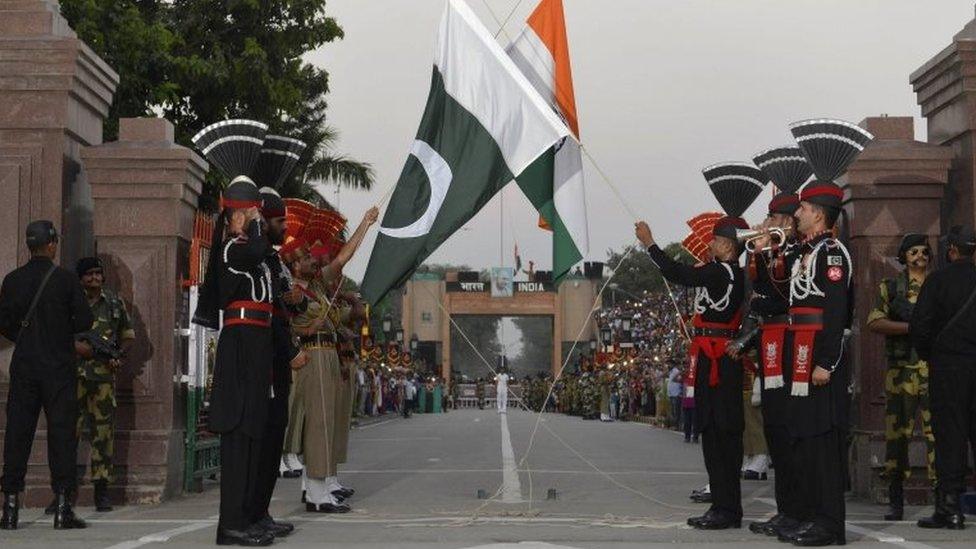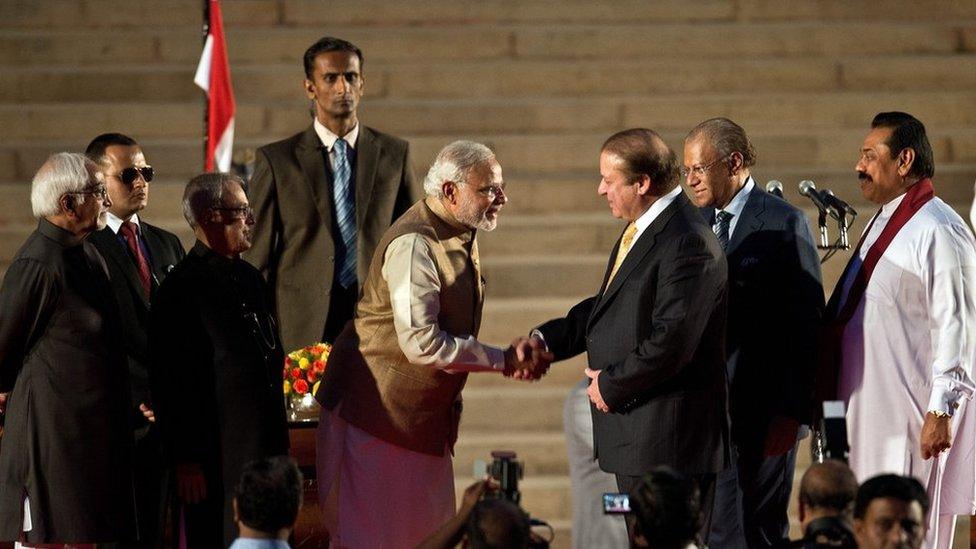Has Narendra Modi's foreign policy bubble burst?
- Published

There have been violent protests against India in Nepal in recent days
Prime Minister Narendra Modi has returned to India after a high-profile visit to the United States where he rubbed shoulders with global leaders, met industry representatives and also reached out to the large and increasingly influential Indian diaspora.
The highlight of the visit was his trip to Silicon Valley - the first by an Indian premier in decades. It was high on symbolism - the Bay area is where many Indian Americans have built their professional reputation and, of course, a number of them now head some of the world's leading technology firms.
But even as the prime minister wowed the US, there is trouble back home - in India's immediate neighbourhood.
Its relationship with China has never been particularly strong; Maldives and India are straining at the edges and ties with Sri Lanka are only just back on track. And in recent weeks, India's relations with two of its most significant neighbours, Nepal and Pakistan, have turned decidedly rocky.
That's not good news for a prime minister who not long ago appeared to place improved relations with India's immediate neighbourhood at the core of his foreign policy. So what has gone wrong?

Nepal

Tension between Nepal and India has spiked since Kathmandu adopted a new constitution last week
A spat with Nepal over the country's new constitution is threatening to break out into a full-fledged diplomatic row.
India is Nepal's powerful neighbour but is the only country that did not wholeheartedly welcome its new constitution after protests by ethnic communities living in the plains bordering India.
The protesters have blocked the main border crossings into Nepal from India, choking off a key supply route through which the landlocked country gets much of its requirements, including fuel.
Nepal has accused India of both fanning the protests and imposing the blockade. Delhi has strongly denied this, saying truckers are refusing to cross the border because of the security situation on the other side.
It's an astonishing turnaround in relations which many Nepalis find inexplicable.
Last year, Nepal was among the first countries that Mr Modi chose to visit after his landslide election victory.
His visit, where he interacted with Nepali political leaders across the spectrum but also reached out to members of the public, created enormous goodwill.
"He was such a friend - he owned the hearts and minds of the Nepalese people," top Nepali politician KP Oli - widely expected to become the next prime minister - told me.
Now many in Nepal believe that all of that goodwill has evaporated, a sentiment shared by some in India too.
"There was no point sending a special envoy to urge Nepalis to hold off from promulgating the constitution when it had already been passed by the assembly," says Prof SD Muni, a strategic analyst who closely follows Nepal.
He was referring to the decision to send India's Foreign Secretary S Jaishankar to Kathmandu hours after the constitution was voted in overwhelmingly.

Pakistan

Relations between India and Pakistan have deteriorated in recent months
If relations with Nepal are bad, those with Pakistan are back on familiar ground.
There is tension along the border, acrimonious exchanges at the UN and almost no progress on long-delayed peace talks.
But even here, there had been a flicker of hope a year ago.
Mr Modi surprised everyone by inviting Pakistan's Prime Minister Nawaz Sharif to Delhi for his inauguration. Mr Sharif surprised most by attending, apparently against the wishes of his powerful army chief.
Since then, scheduled foreign office talks and a planned meeting between the national security advisors of the two countries have been called off by India because of differences over Kashmir.
In Islamabad, many believe that Mr Modi has undercut Mr Sharif.
Cancelling the talks "weakened Nawaz's ability to improve relations with India", writes Saira Bano of the Stimson Centre in The Diplomat.

Mr Modi surprised everyone by inviting Pakistan's PM Nawaz Sharif for his inauguration and Mr Sharif surprised most by attending
"Narendra Modi's massive election victory and his position as a nationalist gives him the space to deal with Pakistan from a position of strength - one that allows him to be expansive," one Islamabad-based Western diplomat told me.
"A stable, economically strong Pakistan is surely in India's interest," he added.
One reason why some believe that the Indian prime minister has let things slide is because his foreign policy is being directed by advisors who have little diplomatic experience in the region.
His National Security Advisor Ajit Doval is a former intelligence chief who has served in Pakistan but is seen as too hardline.
Foreign Secretary Jaishankar is an acknowledged expert on China and the United States but has never directly handled any of India's neighbours.
"Previous prime ministers often relied on advisors who had plenty of experience in dealing with Pakistan and understood the country," says KP Nayar, consulting editor of The Telegraph newspaper.
For many in India, Narendra Modi is seen as the country's best brand ambassador. That's quite apparent from his many overseas visits in his first 16 months in office - he has generated plenty of interest, airtime and drawn adulation from the extensive Indian diaspora.
But that may not be enough in sustaining relationships in the neighbourhood, as he is fast finding out.
